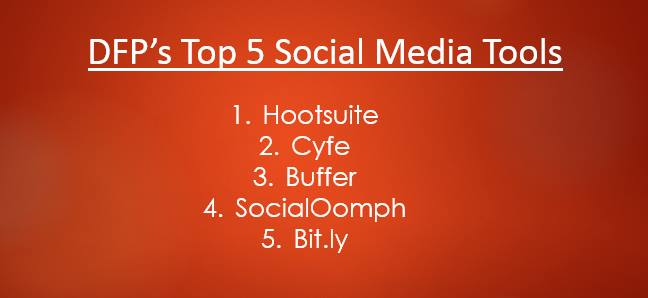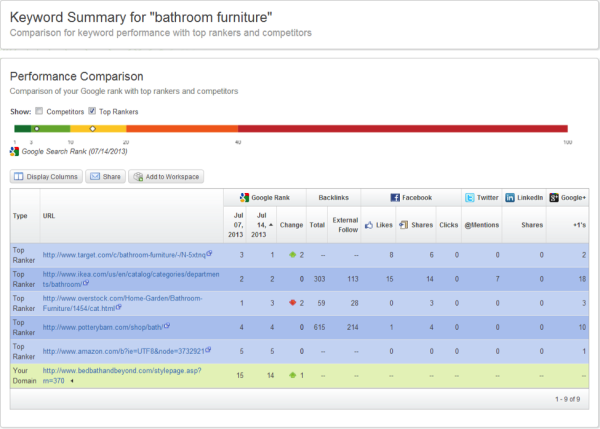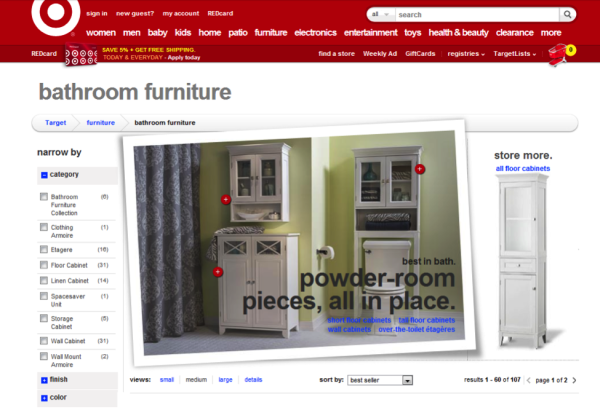Targeting ads at specific company employees?
A few outside-the-box social media advertising techniques from our friends at Search Engine Watch:
Six social media advertising ideas to make you look like a big deal
Targeting ads at specific company employees?
A few outside-the-box social media advertising techniques from our friends at Search Engine Watch:
Six social media advertising ideas to make you look like a big deal
Our top 5 social media tools….did yours make the list?
Sharing an article from SEO MOZ for all the bloggers out there. Enjoy!
http://www.seomoz.org/blog/21-tactics-to-increase-blog-traffic-2012
A great Whiteboard Friday from Rand: http://www.seomoz.org/blog/fixing-the-broken-culture-of-seo-metrics-whiteboard-friday
As an approach, focusing exclusively on one’s own efforts is not without merit. But looking up and taking in your surroundings in the SERPs can have both strategic and tactical benefits.
The insight that can theoretically be derived from a competitive analysis process can fill volumes, but I’m going to focus on three specific angles outlined below.
Before you even get started digging into the nitty gritty details of what your competition is doing, it pays to start by checking your assumptions of who you consider to be your competitors.
For example, at Conductor, we’ve encountered more than one occasion where a brick-and-mortar retail store insisted their competitors were X, Y, and Z (because they primarily compete with them in the brick-and-mortar world), only to have us show them the online retailers that consistently show up at the top of SERPs for the queries they care about are actually A, B, and C.

Once you’ve nailed down your primary competitors, consider taking the next step by analyzing their product lines (particularly if you have a number of different product lines).
For example, the image below shows that “Acme Online Retailer” has very different competition in the furniture industry than it does in the apparel industry. Knowing this creates a tactical advantage in the SERPs and can guide both future strategy and tactics in both verticals.

Analysis of competitors can reveal things like backlink profiles and on-page optimization strategies, sure. But it can also show you how other industry experts think about and organize their products.
For example, by looking closely at how Target organizes their bathroom furniture, an online furniture retailer can get ideas about how to categorize the products on their site. This matters because site taxonomy can influence how search spiders interpret and present your site in the search listings, and can even impact search rankings.

Paying even a small amount of mindshare to what your competition is doing with their content can pay significant dividends. Competitors can give you excellent insight about how to create and present content in your industry.
Let’s take a look at another one of Acme Furniture’s competitors, IKEA:
The top portion of the page reveals well laid-out, informative content intended to help the purchaser make a decision and encourage them to think about other potential home improvements.
The bottom portion of the page reveals a tasteful, non-pushy call-to-action.
This well-presented, informative page without a pushy sales pitch may ultimately explain why it is ranking above Acme’s own page — both because visitors researching bathroom furniture link and share to it and because, in a post-Hummingbird world, Google has continuously improved on identifying useful content.
Acme’s taking the time to analyze their competitors’ presentation of content can help them to take steps to adapt their own content to achieve similar success.
Give Some Mindshare To Competitive Analysis
You certainly need to focus on your own performance in the search results, but spending just a little time with competitive analysis may actually make that easier and more efficient. Think of it this way: your competitors have been spending time and resources on figuring out how to sell a product that’s similar to yours.
A strategic analysis can allow you to reap some of those benefits. So, if you are not currently giving any mindshare to competitive analysis, consider if some of the techniques outlined above can offer you valuable strategic and tactical insight.
Excellent article by @geoffkenyon on tracking the Online ROI of Offline Advertising:
http://moz.com/blog/how-to-track-online-roi-of-offline-advertising
Webmasters all over the world felt the shake on 10/17/14 as Google rolled out its newest algorithm update, Penguin 3.0. This was the largest Google algorithm update since the latest Panda update in September 2013. But just how big was it? And where any particular industries affected more than others?
Luckily, our friends at Moz have the answers, and the data to back it up. Take a look here: http://moz.com/blog/how-big-was-penguin-3
One of the most frequent questions we receive at DFP is one that businesses struggle with as they develop their digital marketing & online advertising strategies: Which is better for me: SEO or PPC?
SEO (Search Engine Optimization) is the practice of optimizing all your digital assets to rank higher than your competition in natural & organic SERP (search engine results page) for target keywords, with Google being priority.
PPC (Pay-Per-Click), on the other hand, is paying search engines (and display networks) for advertising space for specific target keywords.
Here’s a Google search for “best seo company nyc”, where Digital Footprint ranks organically via SEO (orange arrow) and our competitors are paying for clicks on the top and on the right (blue arrows):
So which is better? The instant traffic and leads that come from PPC? Or SEO’s consistent return on investment long-term?
A few quick facts:
• Studies have shown that anywhere from 60-80% of Internet users view organic SEO listings to be more credible than PPC listings. This makes sense, as a business showing up organically on its own as opposed to paying for a slot has more inherent trust value. However, data has also shown that when it comes to PPC, over 50% of Internet users are more inclined to purchase from a seller’s advertised website on a paid ad than clicking on their organic listing.
• Noteworthy is CTR (click-through-rate) of SERP (search engine results page). For any given SERP, users click on organic listings 85-92% of the time, and the paid listings get the other 8-15% of the clicks. Let’s use the above example search of our own firm for “best seo company nyc”. While the 10 organic listings are competing for roughly 85% of all available clicks, the 11 paid listings are competing for at most 15% of the market share of that SERP. CTR on SERP is a knockout win for organic SEO.
• On the other hand, PPC provides instant ranking and immediate results (compared to the long-term organic approach) and thus it is a much faster way of building traffic. If you wanted to rank on Google SERP tomorrow for “best seo company nyc”, you could buy an ad today and have it live tomorrow. If you wanted to show up organically however, this would take months or even years of SEO optimization, depending on the keyword competitiveness and landscape.
• ROI of SEO continues to increase over time, while PPC has a more definite ROI once it has reach its peak. In other words, SEO has a longer shelf-life and a less defined ROI, whereas the ROI of a PPC campaign tied to a particular budget can be easily measured on a daily, even hourly basis.
Pay-Per-Click (PPC) Pro’s
• PPC gives you instant results, and can generate visitors almost immediately. SEO campaigns need time to accumulate links, content, and traffic to build authority and leads for your site?
• You can manage your budget and RIO much more easily and in real-time with PPC. We have clients with certain campaigns that need hourly bid adjustments as data populates. The metrics provide the data necessary to continually optimize their campaign for conversions and cost-efficiency.
• On many sites, especially in retail, over 50% of people who arrive at their site from their paid ads are more likely to buy than those who clicked on an organic link.
• Instant traffic to your website. We have to stress this again. Imagine there was no Internet, and the only way companies could advertise was through billboards. PPC allows you to be able to buy a digital billboard in Times Square and have it up immediately.
• Control of consumer behavior. With PPC, you control the ad copy directly and immediately, the exact keywords that trigger each ad, and even the destination URL that the user is sent to once they click on the ad (i.e. different product/service pages on your sites for different ads).
• No worrying about algorithm updates. PPC ads are never impacted like the organic listings in SERP when Google and other search engines roll out another algorithm update.
• Laser-target your audience – you can specify a huge amount of target modifiers (based on demographics, geography, industry, age, gender, parental status, etc.) allowing you to target your exact customer base.
Pay-Per-Click Con’s
• Cost. Pay-per-click can be very expensive, especially if the campaign is not properly optimized and managed. We’ve had businesses come to us with existing campaigns that are have paid large PPC costs with little return; campaigns that are cost-inefficient, not properly optimized with keywords and ad groups, and not targeted to the right audiences. Please ensure your digital marketing company or manager is a Google Partner, Google Adwords-qualified and can show you results of previous campaigns; the difference is astronomical.
• PPC campaigns are built on data. This takes constant A/B testing of different keywords, ad copy, ad groups, landing pages, and campaigns for the best possible performing campaign, which takes a lot of time many businesses can’t allocate in-house.
• PPC campaigns also must be optimized constantly. We’ve seen countless campaigns with a “set-it-and-forget-it” mentality. Campaigns that are created, a daily budget is set, and they hope for results. This almost always leads to unquestionably poor performance and return on investment. The right PPC campaign requires constant optimization and fine-tuning to produce the best-performing campaign that meets KPIs and ROI.
Visitor traffic for the same site with the same budget. Note the huge spike in PPC traffic initially then drop as budget exhausts, as well as the long-term traffic growth for SEO.
Search Engine Optimization (SEO) Pro’s
• Prominent exposure & natural credibility – having a top organic listing on SERP not only brings with it prominent exposure when people are searching for the products and services that your business (and competitors) offers, but organic search results are inherently viewed as more credible and trustworthy because they are not paid ads. In the “best seo company nyc” example, would you trust a company that naturally has placement there, or a company that paid to be called the best seo company in NYC?
• Performance – 85% of all clicks on a search are on the organic listings. Much bigger market share of SERP -> more clicks -> more traffic -> more customers.
• Exposure on multiple platforms. If your site is well-optimized for SEO, chances are it not only appears on Google, but also Yahoo, Bing, and other search engines and display networks. A strong site is a strong site anywhere on the Web.
• Return on Investment – SEO’s ROI will sustain and continually rise long after PPC has peaked or depleted its budget. Once you stop paying for the ads, you’re off the map again. However, a strong SEO-optimized site should remain there forever.
Search Engine Optimization Con’s
• Time. Quality SEO takes time, no two ways about it. To build a strong digital footprint with your web assets, and to develop a digitally authoritative presence, you need to build that brick-by-brick.
• High Competition – Depending on your industry and target keywords, your competition could be huge corporations with seemingly unlimited budgets and resources allocated to SEO. No one sets out to do SEO going after Page #2 – everyone wants first page rankings. Page 2 gets 5.59% of all clicks, Page 1 gets over 94% of all clicks.
• Susceptibility to algorithm updates. An algorithm update (like Google’s most recent Penguin update), can shuffle the search results dramatically and can make or break a business. This is why it’s crucial that businesses find a partner with proven results that carry out campaigns not just for the short-term, but for long-term strategy also in mind.
Our Answer
So we’ve listed all the pro’s and con’s, but what’s the answer to the age-old question: Which is better, SEO or PPC? The short answer is it depends on your business. Every digital marketing campaign should be crafted based on the exact profile of that business, their competitors, their target market, the competitiveness of their target keywords, and a number of other factors.
Some of the best case studies we have for our own clients involve a combination of the two, so in a way you could also say our answer is both. We’ve had clients that only do SEO, some that only do PPC, but the best results are clients that opt to dominate both areas of SERP. When you have both paid and organic listings on SERP (and a second organic listing for your landing page or microsite, and a Google Maps listing, and a listing to your social media accounts, and a YouTube video listing, etc.) we begin to see digital brand dominance. This is when you show up so often on SERP that the customer has no choice but to click on one of your digital assets. Digital brand dominance makes us very happy. We’ve also had success with clients that use PPC to rank instantly, and choose to save that cost once their organic SEO kicks in and they begin to rank organically. It really depends on the business.
To find out more information on whether SEO or PPC is right for your business, feel free to fill out our digital marketing questionnaire. The information provided back to you by a digital marketing specialist is of no obligation to you, and should give you an idea on the best path for your business’s digital marketing goals.
Looking forward to your feedback!
The DFP team